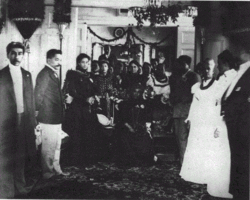This is your morning Open Thread. Pour your favorite beverage and review the past and comment on the future.
Find the past “On This Day in History” here.
Click on images to enlarge
July 12 is the 193rd day of the year (194th in leap years) in the Gregorian calendar. There are 172 days remaining until the end of the year.
On this day in 1862, the Medal of Honor is created.
President Abraham Lincoln signs into law a measure calling for the awarding of a U.S. Army Medal of Honor, in the name of Congress, “to such noncommissioned officers and privates as shall most distinguish themselves by their gallantry in action, and other soldier-like qualities during the present insurrection.” The previous December, Lincoln had approved a provision creating a U.S. Navy Medal of Valor, which was the basis of the Army Medal of Honor created by Congress in July 1862. The first U.S. Army soldiers to receive what would become the nation’s highest military honor were six members of a Union raiding party who in 1862 penetrated deep into Confederate territory to destroy bridges and railroad tracks between Chattanooga, Tennessee, and Atlanta, Georgia.
The first formal system for rewarding acts of individual gallantry by American soldiers was established by George Washington on August 7, 1782, when he created the Badge of Military Merit, designed to recognize “any singularly meritorious action.” This decoration is America’s first combat award and the second oldest American military decoration of any type, after the Fidelity Medallion.
Although the Badge of Military Merit fell into disuse after the American Revolutionary War, the concept of a military award for individual gallantry by members of the U.S. armed forces had been established. In 1847, after the outbreak of the Mexican-American War, a Certificate of Merit was established for soldiers who distinguished themselves in action. The certificate was later granted medal status as the Certificate of Merit Medal.
Early in the Civil War, a medal for individual valor was proposed by Iowa Senator James W. Grimes to Winfield Scott, the Commanding General of the United States Army. Scott did not approve the proposal, but the medal did come into use in the Navy. Senate Bill 82, containing a provision for a “Medal of Honor”, was signed into law (12Stat329) by President Abraham Lincoln on December 21, 1861. The medal was “to be bestowed upon such petty officers, seamen, landsmen, and Marines as shall most distinguish themselves by their gallantry and other seamanlike qualities during the present war.” Secretary of the Navy Gideon Welles directed the Philadelphia Mint to design the new decoration. Shortly afterward, a resolution of similar wording was introduced on behalf of the Army and was signed into law on July 12, 1862. This measure provided for awarding a Medal of Honor, as the Navy version also came to be called: “to such noncommissioned officers and privates as shall most distinguish themselves by their gallantry in action, and other soldier-like qualities, during the present insurrection.”
As there were only two medals that could be issued until the World War I including the Purple Heart, the Medal of Honor was sometimes awarded for deeds that would not later merit that distinction. In 1917, when other medals were created for bravery, a recall was requested for 910 Medals of Honor that had been previously issued, but no longer considered that noteworthy. Thereafter, and until the present day, the Medal was awarded for deeds that were considered exceptional.

 On this day in 1789,
On this day in 1789, 


 On this day in 1917, Arabian troops led by
On this day in 1917, Arabian troops led by
Recent Comments